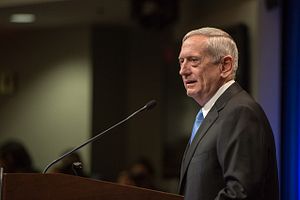U.S. Defense Secretary James Mattis declared North Korea the ‘most urgent and dangerous threat’ to world peace and security in a written testimony for the U.S. House of Representatives’ Committee on Armed Services on June 12.
“The most urgent and dangerous threat to peace and security is North Korea,” Mattis said on Monday. “North Korea’s continued pursuit of nuclear weapons and the means to deliver them has increased in pace and scope,” he added. “The regime’s nuclear weapons program is a clear and present danger to all. The regime’s provocative actions, manifestly illegal under international law, have not abated despite United Nations’ censure and sanctions.” Mattis already called North Korea the “most urgent and dangerous threat to peace and security in the Asia-Pacific,” during his speech at this year’s Shangri-La Dialogue.
During this week’s testimoy, the U.S. defense secretary also warned of the potential losses in the event of a conflict on he Korean Peninsula. “It would be a war like nothing we have seen since 1953 and we would have to deal with it with whatever level of force was necessary … It would be a very, very serious war.” As I explained (See: “What Would the Second Korean War Look Like?”), a military conflict would likely cause the death of tens of thousands of soldiers and civilians within the first 48 hours at a minimum.
However, U.S. policy makers and senior military officers remain most concerned with the prospect of North Korea acquiring intercontinental-range ballistic missile capabilities. Last week, in a testimony before the U.S. House Armed Services Committee on Wednesday, Vice Admiral James Syring, the head of the U.S. Missile Defense Agency said that “the advancements in the last six months have caused great concern to me and others, in the advancement of and demonstration of technology of ballistic missiles from North Korea.”
Syring’s remarks came after the first-ever successful test of the U.S. Ground-Based Midcourse Defense (GMD) system against an intercontinental-range ballistic missile-class (ICBM) target.
“It is incumbent upon us to assume that North Korea today can range the United States with an ICBM carrying a nuclear warhead,” Syring said in his testimony. “Everything that we are doing plans for that contingency (…) in addition to looking ahead to what might be developed or what is possible over the next five to 10 years.”
In a recent piece, I proposed that the United States would do well to start dealing with North Korea as if it was already in possession of a nuclear-armed ICBM to avoid what I called a “reverse-decoupling problem.” South Korea’s President Moon Jae-in said on June 12 that North Korean denuclearization is a matter of survival for South Korea, according to Yonhap news agency.

































